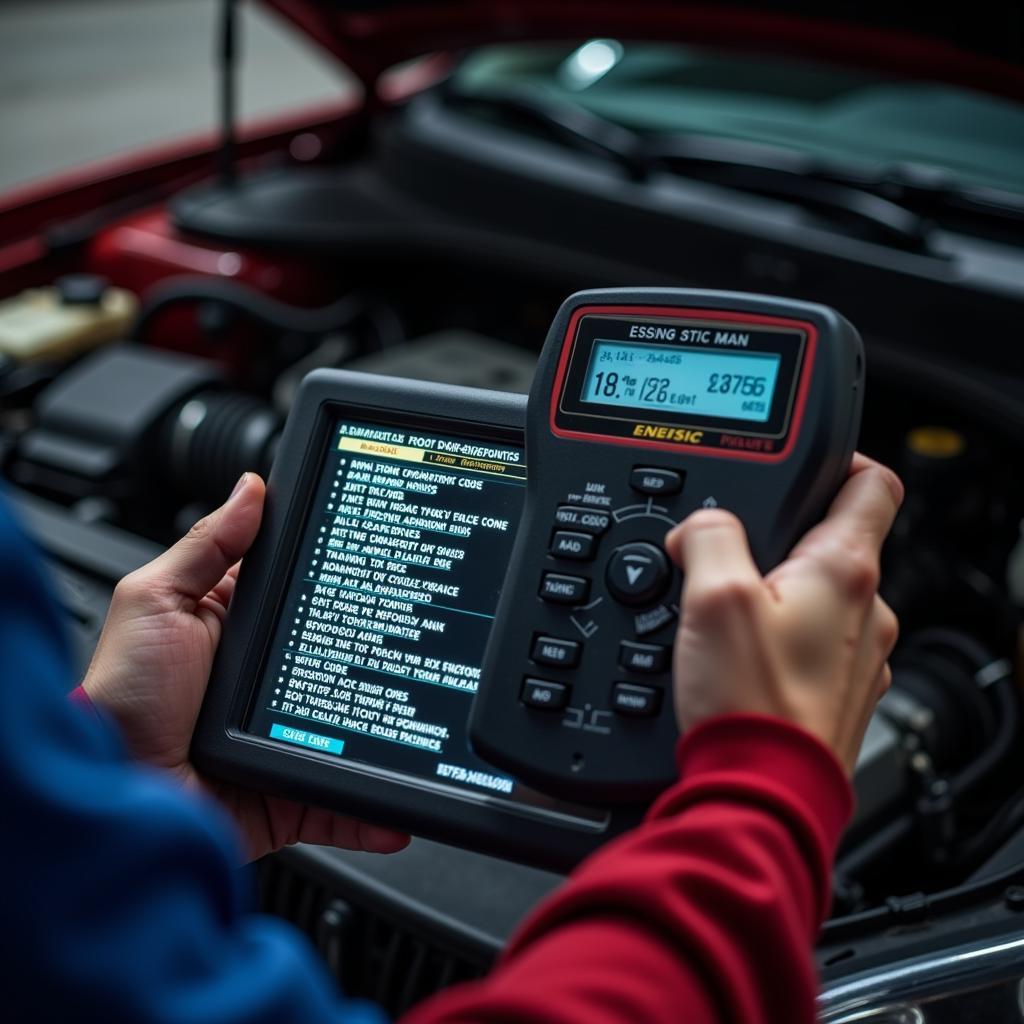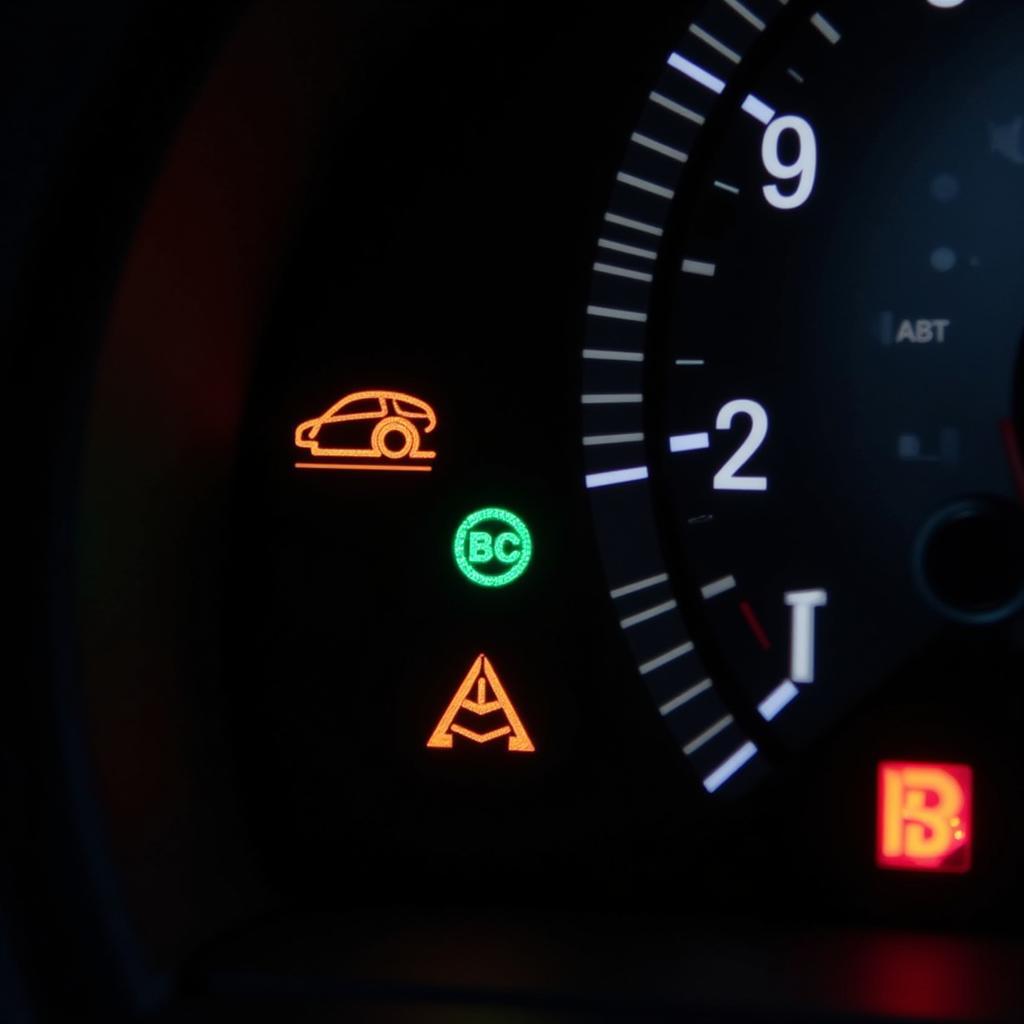A car diagnostic test, often referred to as a car health checkup, is a vital tool in modern automotive maintenance and repair. It can provide invaluable insights into the health of your vehicle, identifying potential issues before they escalate into major problems. But what exactly will a car diagnostic test tell you? Let’s delve into the details.
Unmasking the Mysteries: Understanding Car Diagnostic Tests
Essentially, a car diagnostic test uses a specialized scanner that connects to your car’s onboard computer, the Engine Control Unit (ECU). This sophisticated system monitors various sensors located throughout your vehicle, collecting data on engine performance, emissions, transmission, and more. The test retrieves and interprets this data, revealing any stored error codes or anomalies.
Decoding the Language of Your Car: Diagnostic Trouble Codes (DTCs)
The information revealed by a diagnostic test comes in the form of Diagnostic Trouble Codes (DTCs), also known as fault codes. These alphanumeric codes act as flags, pinpointing specific areas within your vehicle’s systems where a malfunction has been detected.
 Diagnostic Trouble Code List
Diagnostic Trouble Code List
For instance, a code like “P0301” indicates a misfire detected in cylinder 1. While this code provides a starting point, it’s crucial to remember that DTCs are not definitive diagnoses. They are indicators that guide mechanics towards the potential root of the problem. Further investigation is often required to accurately diagnose and address the issue.
Beyond the Codes: The Scope of a Car Diagnostic Test
While DTCs form the core of a diagnostic report, the information gleaned from a car diagnostic test extends far beyond just error codes. It provides a comprehensive overview of your vehicle’s health, covering various systems and components:
Engine Performance:
- Fuel System: Monitoring fuel pressure, injector performance, and air-fuel mixture.
- Ignition System: Checking spark plugs, ignition coils, and timing.
- Emissions System: Analyzing oxygen sensor readings, catalytic converter efficiency, and evaporative emissions control.
Transmission System:
- Gear Engagement: Identifying issues with shifting, slippage, or clutch operation.
- Fluid Pressure and Temperature: Monitoring transmission fluid condition and potential overheating.
- Electronic Control Module: Assessing the functionality of the transmission control unit.
Other Essential Systems:
- Anti-lock Braking System (ABS): Evaluating wheel speed sensors, hydraulic unit functionality, and control module communication.
- Airbag System: Checking airbag sensors, deployment circuits, and module status.
- Climate Control: Diagnosing issues with A/C refrigerant levels, compressor operation, and temperature sensors.
When to Seek a Car Diagnostic Test: Recognizing the Signs
Knowing when to schedule a car diagnostic test can save you time, money, and potential headaches down the road. Here are some telltale signs that your car might benefit from a diagnostic checkup:
- Illuminated Check Engine Light: This is the most obvious indicator that your car’s ECU has detected a problem.
- Unusual Noises: Any strange sounds emanating from your engine, transmission, or brakes warrant attention.
- Performance Issues: Experiencing rough idling, stalling, decreased fuel efficiency, or hesitation during acceleration? A diagnostic test can help identify the cause.
- Emissions Test Failure: If your vehicle fails an emissions test, a diagnostic test can pinpoint the source of the problem.
 Car Dashboard with Warning Lights Illuminated
Car Dashboard with Warning Lights Illuminated
Empowering Informed Decisions: The Value of Car Diagnostic Tests
Understanding what a car diagnostic test tells you empowers you to make informed decisions about your vehicle’s maintenance and repair. It provides:
- Early Detection: Identifying minor issues before they escalate into major problems, saving you costly repairs in the long run.
- Accurate Diagnosis: Guiding mechanics towards the root cause of a problem, avoiding unnecessary guesswork and part replacements.
- Budgeting and Planning: Providing a clearer picture of potential repair costs, allowing you to budget accordingly.
- Peace of Mind: Offering reassurance and confidence in your vehicle’s safety and reliability.
FAQs: Your Car Diagnostic Questions Answered
Q: How much does a car diagnostic test cost?
A: The cost of a car diagnostic test can vary depending on your location and the mechanic you choose. You can learn more about the average costs and factors that influence pricing in our detailed guide: How Much Does a Diagnostic Test Cost On a Car?
Q: Can I perform a car diagnostic test myself?
A: While basic OBD-II scanners are available for consumer use, accessing the full range of data and interpreting DTCs often requires specialized equipment and knowledge. For comprehensive diagnostics and accurate interpretation, consulting a qualified mechanic is recommended.
Q: What is a DTC on car diagnostics?
A: DTC stands for Diagnostic Trouble Code. You can find more information about DTCs and their significance in our article: What is a DTC on car diagnostics?
Q: What does a car diagnostic test tell you?
A: A car diagnostic test can tell you a lot about the health of your vehicle, from engine performance to transmission function and more. To delve deeper into the specifics, refer to our comprehensive guide: What does a car diagnostic test tell you?
Beyond the Basics: Exploring Further
For those seeking a more in-depth understanding of car diagnostics, we offer a wealth of resources:
- How much cost car diagnostic?: How Much Cost Car Diagnostic
- How much to get a car diagnostic?: How much to get a car diagnostic
Remember, knowledge is power when it comes to car maintenance. By understanding the value and insights provided by a car diagnostic test, you can make informed decisions that keep your vehicle running smoothly for miles to come.
Need assistance with car diagnostics or have further questions? Contact us via WhatsApp: +1(641)206-8880, or Email: [email protected]. Our dedicated team is available 24/7 to provide expert support.

Leave a Reply